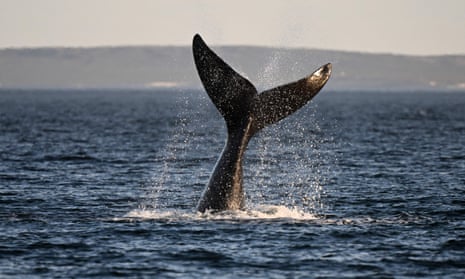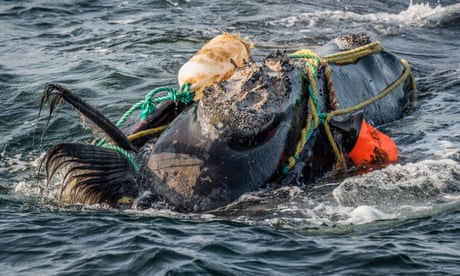Our City's namesake, Saint Augustine, said, "An unjust law is no law at all." This whale-killing legislation is an unjust law and must be stopped.
Thank God for United States Senate Rule XXII and floor amendments. This obnoxious provision must be deleted. Senator Charles Schumer's support of whale-killing legislation is a stench in the nostrils of our Nation. There are only 340 North American right whales left. Take the time to get this right, please.
From The Guardian:

Animal protectionists are accusing Democrats in the US Senate of selling out the critically endangered northern right whale by including a provision in a year-end funding bill that would allow Maine’s lobster industry to continue using fishing gear that maims the species, often fatally, until at least 2028.
According to the Center for Biological Diversity, an unprecedented right whale policy rider inserted by Democratic senators Chuck Schumer of New York and Patrick Leahy of Vermont into the omnibus funding budget released on Tuesday effectively condemns the right whale to extinction.
By most estimates, the species counts 340 individuals, including just 70 breeding females, and has been declining markedly in population numbers over the past decade. Environmentalists maintain that right whale mortalities often result from their becoming tangled in ropes and buoys used to mark lobster traps.
Any delay in forcing the introduction of ropeless traps will almost certainly put the right whale on a course toward extinction, the non-profit Center for Biological Diversity said in a statement.
“Schumer and Leahy are extinction Democrats who just heartlessly put special interests above our nation’s beautiful natural heritage,” the center’s government affairs director, Brett Hartl, said.
“Right whales have migrated along New York’s coastline for thousands of years, but … Schumer’s action will make this generation the last to witness these remarkable creatures. What a horrific legacy to leave to one’s grandchildren.”
Speaking with the Guardian, a spokesperson for the center, Patrick Sullivan, said that the decision to legislatively overturn an earlier federal court ruling that delayed the implementation of changes to lobster fishing practices by two years meant that Democrats had caved in to the industry.
“Apparently it was able to pressure even Senator Schumer and others to take this really appalling approach to the problem,” Sullivan said. “We’ve always said that the lobster industry needs support as it transitions to whale-friendly approaches, but it cannot come at the cost of the extinction of the right whale, which is what this bill is about.”
Last month, Joe Biden signaled his support for Maine’s $1bn lobster industry when the president served the crustacean to 200 guests at a White House state dinner for the French president, Emmanuel Macron.
The right whale legislation attached to the year-end omnibus bill orders additional whale protection measures “utilizing existing and innovative gear technologies, as appropriate” by 4 December 2028, and for a report on the status of the right whale to be submitted each year.
Despite some additional funding to the Environmental Protection Agency, the interior department and the US Fish and Wildlife Service, the “amounts remain well short of what’s needed to address the extinction crisis”, according to the biological diversity center.
According to Sullivan, the next few years will be crucial for the right whale. “When you see high levels of mortality and low levels of reproduction it doesn’t take long for a species to get to a point where recovery becomes very, very difficult, if not impossible,” he said.
Studies show that climate change-induced warming in the Gulf of Maine has resulted in decline in copepods, the whale’s food source. That has probably contributed to a decline in the number of female whales reproducing.
In 2009, 39 calves were born, according to one study. No right whale calves were born in 2018.
Over the past decade, the population is estimated to have decreased by approximately 26% from about 500. Mortalities have been blamed on ship strikes in the Gulf of St Lawrence and, increasingly, from entanglement in lobster fishing gear.
“There are very few whales and a lot of gear in the water,” the We Are All Whalersauthor Michael Moore – of Woods Hole Oceanographic Institution – told the Guardian earlier this month. “We’re not managing to avoid lethal entanglement or entanglement that’s detrimental to their health. For whales to reproduce and for their numbers to recover, they have to be fit, fat, healthy.”
“They’re really susceptible, much more so than other whales,” said the Leviathan author Philip Hoare, “and it’s pretty sad and kind of crazy that this is happening off the shores of the richest democracy on Earth.”
With politicians resisting swift implementation of measures to save the whale, it may be up to consumers to take action. The Whole Foods chain in November removed lobster from its stores after California-based Seafood Watch added US and Canadian lobster fisheries to its “red list”, meaning that they are considered to be at high risk of harming the environment.
Earlier this month, the non-profit Marine Stewardship Council’s suspension of the certification it awarded to the Maine lobster industry takes effect. The council called whale entanglement a “serious and tragic situation”.
Sullivan, the biological diversity center spokesperson, said the right whale species could still be saved through immediate action to protect it from entanglement.
“The window is really narrow and this legislation shuts it,” he said. “It really puts the right whale on a very bad trajectory and we are very concerned about where things go from here.”
“A four-year delay is devastating not only because of the whales who might have been saved, but because of the inevitable delays between agreeing on a policy and implementation, resulting in even more avoidable losses,” said the director of animal legal education at George Washington University, Kathy Hessler.
“It’s long past time to do what we can to stop causing the harm to the whales, as well as other aquatic animals, and the ecosystem. We have options that we aren’t using that would protect the whales and allow the industry to continue. There is no excuse not to try them.”

No comments:
Post a Comment